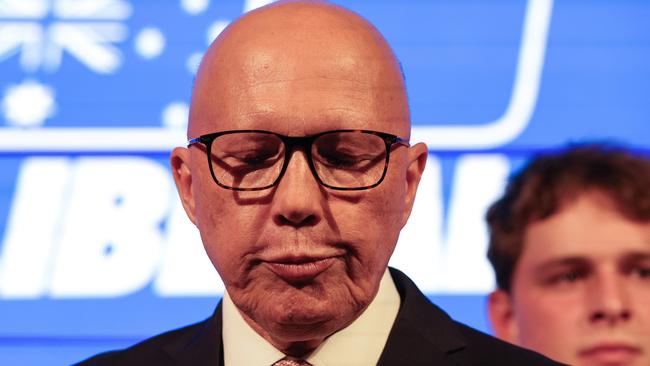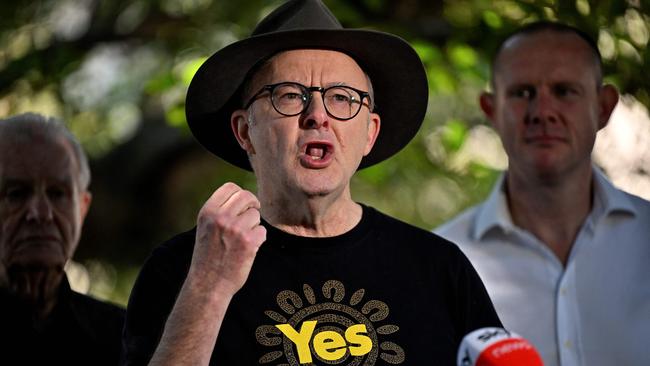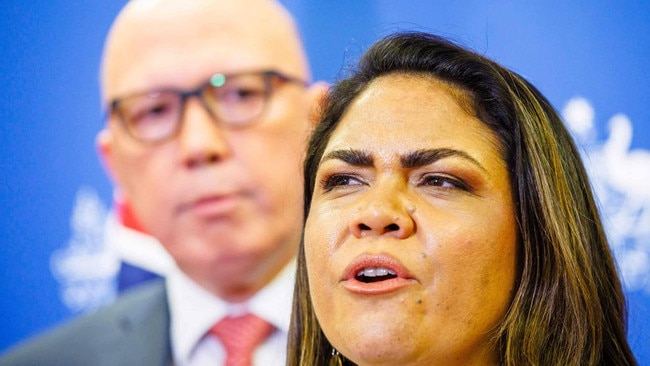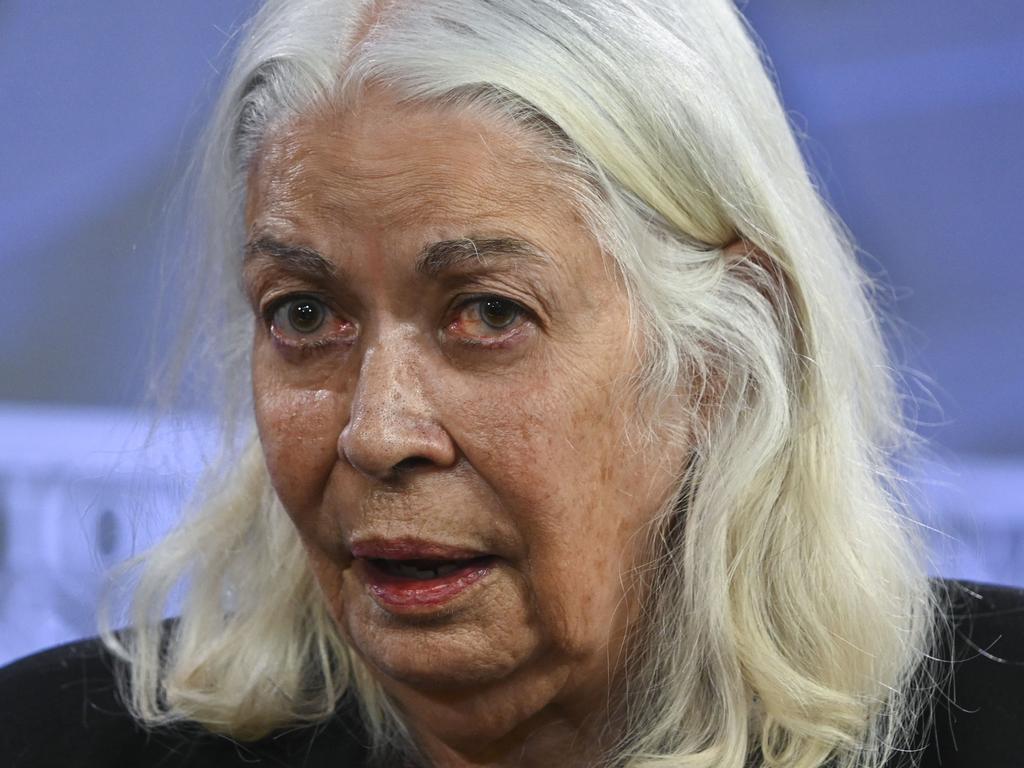Dutton became biggest victim of Indigenous Voice to Parliament’s failure
Had the ‘hard-ass’ opposition leader supported the referendum over greater say for Aboriginal and Torres Strait Islander peoples, he would have had his best chance of transformation.

From the vote on October 14, 2023, the voice became politically toxic. Poisonous for anyone seeking political legitimacy, let alone electoral ambitions, leading up to last Saturday night.
For 18 relentless months the voice was made evil incarnate. It became the most politically incorrect thing to even think about, let alone discuss, in the wake of the referendum loss. The great Australian people saved Australia from the threatening and divisive scourge of the voice by voting 61-39 to say No.
All political commentary, from politicians, pollsters and – down to the near last member – the national press gallery, confirmed the voice was wrong and had justly failed. It was from the very evening of the referendum an electoral liability for Anthony Albanese that threatened to turn his 2022 triumph into a one-term government.
I expected pain in the event of defeat, and the cause of my people would suffer a great setback.
What I didn’t expect was the degree to which the voice would be the subject of relentless scorn, symbolic of the woke madness from which the Liberal-National party opposition led by Peter Dutton had just delivered the country.
Albanese and Labor had to run away fast from their association with the voice and blackfellas, for their opponents were now seeking to hang the albatross of the voice around Labor’s throat.
This Albanese did from the first night. To me it was shameless, but I’m enough of a realist to know that without the assiduous flight from the voice over this past year-and-a-half, last Saturday’s result for Labor would not have been possible. All political capital on behalf of Indigenous Australians was spent – the account was indeed overdrawn – and there was no prospect for anything in the remainder of the first term. Or, in my view, from a second.

There was nothing from the Prime Minister in 2024, and again in 2025. These 18 months past have been the most forlorn in the history of Indigenous affairs. There has been no serious policy or program progress. Extreme paranoia permeated everything to do with blackfellas in Canberra, even in relation to subjects far removed from the voice. This past Easter blackfellas were like Jesus in Gethsemane: Peter (the disciple, not the politician) was in full denial mode, not wanting any association with his poor old mate. The bureaucrats and their ministers were all “obeying in advance”, every calculation was made through the prism: what controversy will Jacinta make of this?
I am not here to deny the voice had become a liability. Albanese’s great achievement in this election was the dexterity with which he extricated himself from its liability and recovered his prime ministership and electoral supremacy. Houdini would have been impressed.
What I will argue, however, is there was one person, one political leader, for whom the voice was a political antivenene rather than the poisonous venom it became for Albanese and everyone else. That person was Peter Dutton.
Had he supported the referendum he would have had the best chance of transforming himself into a supportable prime minister on May 3. Along with the blackfellas, Dutton is the biggest victim of the failure of the voice.
Why do I say this? Let me advance four points.
First, on election night Peta Credlin recalled how, when Tony Abbott won the Liberal Party leadership from Malcolm Turnbull, the task was to reposition Abbott in the minds of the electorate from the perception he had built up to that time. Of course, for Credlin and the hard-right boosters of the LNP, this meant Dutton’s failure was to not go even harder into attack mode and the culture wars.
Putting aside Credlin’s appetite for the culture wars, her basic point was right: with his political persona Dutton was unelectable. He needed a transformation. A real transformation. Not the soft family man stunt with wife and kids in whatever media vehicle is now used for these “softer side” exposes.

No one was going to move past the hard-ass persona Dutton had so deliberately cultivated during his two decades in public life, with such trivia.
Second, moving to the centre – which constitutional recognition represented – rather than further right was the advice Yes pollster Mark Textor gave to prime minister Scott Morrison’s government and to Dutton’s opposition. He told them it was good politics for the Liberals. He showed them numbers. He did this over the course of several years.
One-half of the most successful centre-right political advisory firm in the world, Crosby Textor, was telling his former clients it was in their electoral interests to tack to the centre with the voice.
Textor’s advice did not prevail.
Third, Dutton himself appreciated the situation he faced and had a sense that for him the voice could be an opportunity or threat to his ambitions to become prime minister. That he was serious about seeing if he could thread a path forward was evidenced in his appointment of Julian Leeser as his shadow for Indigenous affairs. Leeser was well-known for his support for recognition and would end up being one of only two Liberals who would support the voice. Dutton would not have appointed Leeser if he wasn’t serious about exploring the possibilities.
I met with Dutton. I knew he was making calculations. I think he well understood the opportunity and the cost of saying Yes or saying No. Both came with opportunities for him and both came with costs.
He told me he admired what Abbott had achieved through relentless attack against Julia Gillard in 2010 and against Gillard and Kevin Rudd in 2013. Abbott was clearly Dutton’s model. That Abbott was the first to lose his seat in northern Sydney in 2019 followed by five more teals in 2022 figured nowhere in this thinking.
In the end the Nationals, led by the one Country Liberal Party member of the Coalition, Jacinta Nampijinpa Price, made the decision for him. And the rest is history.
Dutton’s winnings for saying No came fast and thick. Together with Advance, the LNP not only demolished the referendum, they nearly derailed Albanese’s prime ministership.

The success of the campaign against the voice was so comprehensive and in the absence of Albanese’s adroitness would have proved the rule that Australians always give first-time governments a second chance, by exception.
The LNP and its media supporters were on a roll. Their triumphalism knew no bounds.
The blacks were banished to the wood heap once again, their rightful place in the country. Oh, that Arthur Boyd could once more paint the dismal scene. And every chance a Liberal or National party leader or commentator got to kick the poor blackfellas in the ribs again – they didn’t spare. This was a dog worth kicking. Every yelp of pain, every broken rib, accrued more likes in social media and in the polls. Kicking the voice was a gift that kept giving.
You would think the pain of Aboriginal and Torres Strait Islander peoples who voted with hope for recognition, only to be rejected, might have been met with grace by the victors. But there was no grace whatsoever. There was just unbridled glee.
But the LNP and its most ardent supporters in political commentary deluded themselves. They started to believe in their own campaigning genius. They believed they found their mojo under the leadership of Dutton and Nampijinpa Price.
The LNP was now in striking distance of resuming government in just one term. Praise was lavished on Dutton, and Nampijinpa Price became a folk hero. Darling of white Australia, feted as an incomparable communicator and, absurdly, future potential leader. She quickly came to believe the hype.
As I write, Nampijinpa Price announced her abandonment of the Nationals to pursue her Liberal leadership ambitions. The fallen party should ask how Kemi Badenoch (engineer, lawyer) as Conservative Party leader is working out, notwithstanding her skin colour. Liz Truss (PPE, Oxford) is another example of cultural warrior not being enough. But maybe the Liberals would prefer to follow Labor’s 12 years in the wilderness after Howard’s ascension in 1996, disavowing the winning model bequeathed by Bob Hawke and Paul Keating until the bitter end.
But kicking blackfellas is the easiest and most lucrative politics in Australia: just ask John Howard. And Pauline Hanson.
I said in my Boyer Lecture before the referendum: “We are a much unloved people. We are perhaps the ethnic group Australians feel least connected to. We are not popular and we are not personally known to many Australians. Few have met us and a small minority count us as friends. And despite never having met any of us and knowing very little about us other than what is in the media and what WEH Stanner, whose 1968 Boyer Lectures looms large over my lectures, called “folklore” about us – Australians hold and express strong views about us, the great proportion of which is negative and unfriendly. It has ever been thus. Worse in the past but still true today.

“If success in the forthcoming referendum is predicated on our popularity as a people, then it is doubtful we will succeed. It does not and will not take much to mobilise antipathy against Aboriginal people and to conjure the worst imaginings about us and the recognition we seek. For those who wish to oppose our recognition it will be like shooting fish in a barrel. An inane thing to do – but easy. A heartless thing to do – but easy.”
Dutton relished the immediate rewards of opposing the voice, but the cost would not come until last weekend’s poll. Having slaughtered fish in a barrel, they saw themselves as battle-hardened warriors in the culture wars.

Finally, what has happened to the Liberal Party is exactly what Andrew Gee, federal member for Calare in NSW, predicted before the referendum. The former National Party MP was the only member of the Nationals to advocate and vote for the voice. Like other Nationals in the years before, he had been a supporter during the Morrison years.
He told Radio National in August before the referendum: “As the election draws closer … how we gonna win these seats? Where is the path to victory here? … (the Liberals will) realise that they just burned a large swathe of their supporter base because there are lots of people on the conservative side of politics who actually support the voice … if that campaign to take the voice down succeeded it will be a hollow victory and, to borrow from JFK, that particular victory will ultimately be ashes in their mouths because they’re not gonna get those seats on the Northern Beaches back.”
The tragic scene that has played out in the Dutton household since Saturday night – the sheer agony and pain – is the ashes in the mouth that Gee prophesied. Only his black brothers and sisters, and their children, know anything of the pain that now consumes Dutton.
Gee won his seat on Saturday, notwithstanding he was a Yes man in a regional seat and despite his old party throwing everything at him. The difference between Gee and Dutton at the end of the day was integrity of leadership.
So where does this leave things?

Albanese won two more terms. He will be a three-term prime minister. He will not do anything in this second term beyond what is clearly outlined in his policy platform. He is not going to risk political capital. The Labor Party will not be bold again.
For Nampijinpa Price, this election is her denouement as a one-trick pony. Her great power came from her willingness to take up the mantle against her own people, and 61 per cent of Australians rejoiced in the relief from history she gave them. You can’t just replay your greatest single hit and expect to have a political career of any substance. She has served her purpose. There is nothing left in her bag of tricks. All she is good for is to play the old hit single again and again.
The problem for the Liberal Party was the remaining 6.2 million Australians who voted for the voice included many whom Dutton needed on Saturday. The Liberals will need a good number of them if they are ever to emerge from the ashes of this defeat. Meanwhile, Mr Dutton, welcome to hell.
Noel Pearson convenes the Cape York Institute for Policy and Leadership.






To join the conversation, please log in. Don't have an account? Register
Join the conversation, you are commenting as Logout